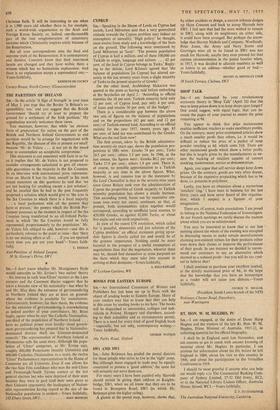CYPRUS
SIR,—Speaking in the House of Lords on Cyprus last month, Lord Milverton said that a very generalised attitude towards the Cyprus problem may induce an atmosphere of unreality. 'High policy,' he thought, must evolve from study and a knowledge of the facts on the ground. The following were' mentioned by Lord Milverton as 'facts': 'The present population of Cyprus is half a million, and of these 100,000 are Turkish in origin, language and culture. . . . 42 per cent, of the land in Cyprus belongs to Turks.' Reply- ing to the debate, Lord Kilmuir agreed that 'the balance of populations [in Cyprus] has altered cer- tainly in the last seventy years from a slight majority of Turks to the present majority of Greeks.'
On the other hand, Archbishop Makarios was quoted in the press as having said before embarking at the Seychelles on April 2: 'According to official statistics the 18 per cent. Turkish minority hold only 12 per cent. of Cyprus land, pay only 4 per cent. of taxes and receive 30 per cent, of the budget.'
There is a considerable gap between the above two sets of figures on the balance of populations and on the proportions (42 per cent. and 12 per cent.) of Turkish-owned land. According to an official statistic for the year 1937, twenty years ago, 83 per cent, of land tax was contributed by the Greeks. What are the real facts now'?
The first census,, taken by the British administra- tion seventy-six years ago, shows the population pro- portions in 1881 were : Greeks 74 per cent.; Turks 24.5 per cent.; others 1.5 per cent. In 1946, at the last census, the figures were: Greeks 80.2 per cent.; Turks 17.9 per cent.; others 1.9 per cent. There is, of course, no possible approximation to a Turkish majority at any time in the above figures. What, however, is and remains true in the statement by the Lord Chancellor is that in the seventy-nine years since Great Britain took over the administration of Cyprus the proportion of Greek majority to Turkish minority population has shown a steady increase. This ascending trend, borne out by successive cen- suses (one every ten years), continues, so that, at present, both communities taken together would correspond, according to unofficial local sources, to 420,000 Greeks, as against 82,000 Turks, or about five-sixths and one-sixth respectively.
In view of the recent UN resolution, which called for 'a peaceful, democratic and just solution of the Cyprus problem,' an official statement giving up-to- date figures is clearly called for and would be of the greatest importance. Nothing could be more harmful to the prospect of a useful resumption of negotiations than that the negotiators, whoever these may be, should find themselves at cross purposes on the facts which they must take into account in arriving at their decisions.—Yours faithfully, A. RIZO-RANGABt
67 Lexham Gardens, W8


































 Previous page
Previous page